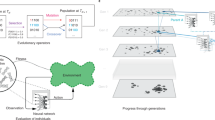Abstract
Evolutionary computation is a sub-field of artificial intelligence and artificial life that uses biologically inspired methods to solve optimization problems, using iterative refinements of a set of solutions via change and selection. This approach, which began in the 1950s, constitutes a growing set of algorithms capable of solving a wide range of problems, divided into various types that differ in selection, mutation, and representation of candidate solutions. Its successful applications are counted in multiple domains, including, but not limited to, optimization, machine learning, robotics, and various areas that study living systems. Evolutionary computation has recently seen a revival, particularly in the study of open-ended evolution, with important implications for the future of AI. It has a unique potential to generate endless innovations and lead to a paradigm shift in the development of artificial intelligence and artificial intelligence life.
Access this chapter
Tax calculation will be finalised at checkout
Purchases are for personal use only
Similar content being viewed by others
References
De Jong K, Fogel D, Schwefel H (1997) History of evolutionary computation. Oxford University Press
Hansen N, Arnold D, Auger A (2015) Evolution strategies. In: Springer handbook of computational intelligence. Springer, Berlin, pp 871–898
Rozenberg G, Bäck T, Joost N (2012) Handbook of natural computing. Springer, Berlin
Kantrowitz M (1997) Genetic algorithms frequently asked questions. CMU Artificial Intelligence Repository
Oka M (2022) ALIFE-artificial intelligence to artificial life (originally in Japanese). Tokyo BNN Publishing
Munetomo M (2008) Genetic algorithms—its theory and methodologies (originally in Japanese). Morikita Publishing
Sims K (1994) Evolving virtual creatures. In: Proceedings of the 21st annual conference on Computer graphics and interactive techniques, pp 15–22
Pedersen J, Moult J (1996) Genetic algorithms for protein structure prediction. Curr Opin Struct Biol 6(2):227–231
Jumper J, Evans R, Pritzel A, Green T, Figurnov M, Ronneberger O, Tunyasuvunakool K, Bates R, Žídek A, Potapenko A et al (2021) Highly accurate protein structure prediction with alphafold. Nature 596(7873):583–589
Callaway E (2022) What’s next for the ai protein-folding revolution. Nature 604:234–238
Kanoh H (2002) Routed guidance for car navigation using genetic algorithms. Inf Process Soc Jpn (21(2001-ITS-008)):51–58
Variengien A, Nichele S, Glover TE, Pontes-Filho S (2021) Towards self-organized control: Using neural cellular automata to robustly control a cart-pole agent. Ar**v:abs/2106.15240
Stern A (1999) Ai beyond computer games. In: AAAI AI and interactive entertainment spring symposium 2000
Stanley O, Lehman J, Soros L (2017) Open-endedness: the last grand challenge you’ve never heard of O’Reilly Media
Damerow J (2012) John von neumann’s cellular automata. Embryo Project Encyclopedia
Frans K, Soros L, Witkowski O (2021) Questions for the open-ended evolution community: reflections from the 2021 cross labs innovation science workshop. Artif Life 25(1):4
Packard N, Bedau M, Channon A, Ikegami T, Rasmussen S, Stanley K, Taylor T (2019) Open-ended evolution and open-endedness: editorial introduction to the open-ended evolution i special issue. Artif Life 25:1–3
Taylor T, Bedau M, Channon A, Ackley D, Banzhaf W, Beslon G, Dolson E, Froese T, Hickinbotham S, Ikegami T et al (2016) Open-ended evolution: perspectives from the oee workshop in york. Artif Life 22(3):408–423
Packard N, Bedau MA, Channon A, Ikegami T, Rasmussen S, Stanley KO, Taylor T (2019) An overview of open-ended evolution: editorial introduction to the open-ended evolution ii special issue. Artif Life 25(2):93–103
Author information
Authors and Affiliations
Corresponding author
Editor information
Editors and Affiliations
Rights and permissions
Copyright information
© 2024 The Author(s), under exclusive license to Springer Nature Singapore Pte Ltd.
About this chapter
Cite this chapter
Yoshida, H., Adams, A.M., Witkowski, O. (2024). Evolutionary Computation: Perspectives on Past and Future. In: Khosravy, M., Gupta, N., Witkowski, O. (eds) Frontiers in Genetics Algorithm Theory and Applications. Springer Tracts in Nature-Inspired Computing. Springer, Singapore. https://doi.org/10.1007/978-981-99-8107-6_1
Download citation
DOI: https://doi.org/10.1007/978-981-99-8107-6_1
Published:
Publisher Name: Springer, Singapore
Print ISBN: 978-981-99-8106-9
Online ISBN: 978-981-99-8107-6
eBook Packages: Intelligent Technologies and RoboticsIntelligent Technologies and Robotics (R0)




